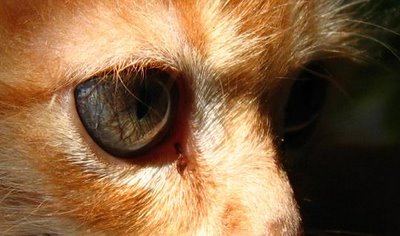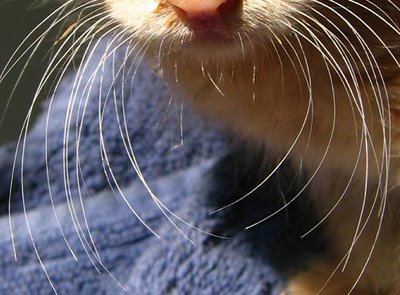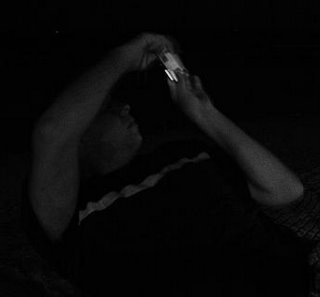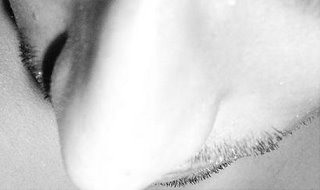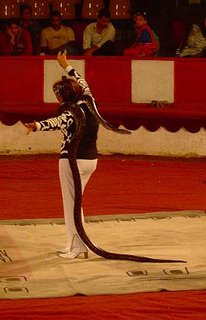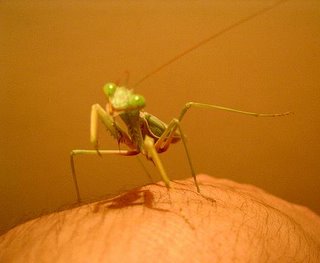Wednesday, March 29, 2006
Monday, March 27, 2006
Kick Cat
When you turn to walk away and find that you're stepping on your kitten or that you've flung it across the room, there is a feeling of horror at having kicked the thing. But deep down it also flatters, that the cat's followed you despite your indifference, or that something chooses to follow you at all.
Fuul Rejection
It was nearly noon and I hadn't had breakfast and was craving fuul--outdoor, aluminum saucer street fuul, specifically. I was on Hoda Shaarawi by Felfela downtown and I headed towards the makeshift fuul stand/station some meters past Ka7lawi (or Afifi to those in the know), the kibda and sogo2 guy (sausages and garlic-chilli stir-fry liver).
The requisite loose crowd was gathered around the fuul stand and around the dining zones that flank it (meter square plywood boards on rusty barrel-tops). There seemed to be more clearing than eating going on, and one man was violently throwing cupfuls of water into what looked like the salad bucket. I noticed that the guy behind the counter was mashing up a seasoned batch of beans in the large transit bowl so I went and stood before him. He looked up and made a quick sun-rises-sun-sets swipe with his hand and said "7amdollah" (Praise be to God) and promptly returned to his seemingly strenuous task.
I asked him, "7amdollah 3ammatan, walla 7amdollah amshi?" (7amdollah in general, or 7amdollah thus I should leave?)
"3ammatan emshi," he said, without looking up (in general you should leave). I said "mashi" (fine) in the most dramatic victimized voice I could produce and walked back to Afifi's for undesired kibda.
Update: Post has been edited, based on Forsoothsayer's comment.
The requisite loose crowd was gathered around the fuul stand and around the dining zones that flank it (meter square plywood boards on rusty barrel-tops). There seemed to be more clearing than eating going on, and one man was violently throwing cupfuls of water into what looked like the salad bucket. I noticed that the guy behind the counter was mashing up a seasoned batch of beans in the large transit bowl so I went and stood before him. He looked up and made a quick sun-rises-sun-sets swipe with his hand and said "7amdollah" (Praise be to God) and promptly returned to his seemingly strenuous task.
I asked him, "7amdollah 3ammatan, walla 7amdollah amshi?" (7amdollah in general, or 7amdollah thus I should leave?)
"3ammatan emshi," he said, without looking up (in general you should leave). I said "mashi" (fine) in the most dramatic victimized voice I could produce and walked back to Afifi's for undesired kibda.
Update: Post has been edited, based on Forsoothsayer's comment.
Wednesday, March 22, 2006
Thy Neighbour's 504
The garage was packed with cars and the old man led me to a makeshift slot on the exit ramp. His steps were jittery and gestured me to wait and then squeezed himself between the front of my car and the back of a parked Peugot 504, staring at me as he put his back side to the car and leaned with all his weight. The car was not moving, but it was meant to be, and knowing this relieved our eye-to-eye of some awkwardness. Sure enough, the car eventually budged, but veered sharply to the left. He got up and walked towards his little station some meters behind where we were, muttering something about a key and getting in trouble as he passed my window. He returned with a small keychain and stooped at the 504’s drivers’-side door and in the dim light I could see him poke into the door handle, shake his head, shake the keychain and poke the other key into and around the chrome strip. He repeated the process shaking and cursing before finally giving up and walking towards me, holding the keychain before him, indicating me to take care of the situation myself. I got out and gently swung my door back into its slot, the soft rattle of cassette tapes, lighters and Halls mints ringing through the breezy hall. “Khosh e3delha enta layeegi yesawwatlena sa7ebha; e3del el 3agal wetalla3ha oddam.” (You get in and park it properly lest the owner give us hell; make the wheels straight and bring it forward.)
The car was in good condition, the paint job seemed recent and the fittings on the outside looked neat. It had two license plates, one was Malaaki El Fayuum and the other an EU plate. I walked over and noticed the key-slot about an inch below the door handle. I tried one of the two keys and it didn’t seem to fit. Examining the other key, I realised the keychain was one of those remote locking/unlocking devices. On it was printed a tiny open padlock and when I pressed the corresponding rubber stub the car came to life, as might a modest lady stepping into a Marilyn Monroe upward gust of air. Its front and tail lights flashed orange and its cabin filled with a flash of blue and the plastic whack of unlocking doors pierced the ‘peep peep’ trumpet-like horn, a sound so shrill on noisy streets but somehow majestic in calm concrete rooms. I got in and gently pulled the door shut and felt around the left side of the steering column, having recalled the various wrong-way-round controls of my grandfather’s old pastel-blue beauty. I found the slot and inserted the smallish key, twisting it backwards not forwards. There followed two raspy coughs and a soft rumble.
I took a moment to feel the car and looked at the gear stick to check the reverse-gear position. The car smelled good. There were no hints of grease, cigarette smoke or leaked petrol. It smelled wholesome and had that subtle perfume of very clean unperfumed skin. It somehow smelled of good people, people who cared and took care and favored freshness over syrupy accessorising. The velvety beige upholstery was spotless and looked new. There was no dog-eared battered tissue box, no cassette cases or sooty crumpled tissues, chocolate wrappers, screwdrivers, wiping cloths or water bottles. Only a dark jacket on the back seat and a single folded white piece of paper on the dash board. On the top passenger-side corner of the windscreen was a Judiciary sticker (scales in a circle with two diagonal stripes, one red and one green) and a Police one (el nesr, the eagle from the national flag), the latter looking fake like the kind sold in accessory shops.
I eased my foot off the clutch and let the car roll back till it came parallel with the wall. I shifted gear and brought it forward, gently pulling on the ribbed right side of the steering wheel to leave things aligned and neat.
My late grandfather had tired of driving just months after buying the 504, and I grew up knowing it simply as that car we used for long trips. It enjoyed a similar respect to the sort my grandfather commanded as patriarch of our very small clan, what with its sensible, reliable machinery and modest jowly look. In time, I too came to use it when there was no other car for an errand. It felt like boat to drive, like it wasn’t actually on the street but tethered to it, floating a foot above on rushing water. It also had a wood-like feel—a firm suppleness, slow spirit and warmth.
I stepped out and locked the car and walked over to mine, got in and moved it some feet forward. I locked the door and walked off but stopped when I realized I’d forgotten to leave my key with the old man. “Ah! Ma3lesh, neseit khales adeek el mofta7,” (Oops, I totally forgot about leaving you the key).
“Ya beih walla yhemmak, di 3arabeeti,” he said (oh, don’t worry, I treat it as my own).
The car was in good condition, the paint job seemed recent and the fittings on the outside looked neat. It had two license plates, one was Malaaki El Fayuum and the other an EU plate. I walked over and noticed the key-slot about an inch below the door handle. I tried one of the two keys and it didn’t seem to fit. Examining the other key, I realised the keychain was one of those remote locking/unlocking devices. On it was printed a tiny open padlock and when I pressed the corresponding rubber stub the car came to life, as might a modest lady stepping into a Marilyn Monroe upward gust of air. Its front and tail lights flashed orange and its cabin filled with a flash of blue and the plastic whack of unlocking doors pierced the ‘peep peep’ trumpet-like horn, a sound so shrill on noisy streets but somehow majestic in calm concrete rooms. I got in and gently pulled the door shut and felt around the left side of the steering column, having recalled the various wrong-way-round controls of my grandfather’s old pastel-blue beauty. I found the slot and inserted the smallish key, twisting it backwards not forwards. There followed two raspy coughs and a soft rumble.
I took a moment to feel the car and looked at the gear stick to check the reverse-gear position. The car smelled good. There were no hints of grease, cigarette smoke or leaked petrol. It smelled wholesome and had that subtle perfume of very clean unperfumed skin. It somehow smelled of good people, people who cared and took care and favored freshness over syrupy accessorising. The velvety beige upholstery was spotless and looked new. There was no dog-eared battered tissue box, no cassette cases or sooty crumpled tissues, chocolate wrappers, screwdrivers, wiping cloths or water bottles. Only a dark jacket on the back seat and a single folded white piece of paper on the dash board. On the top passenger-side corner of the windscreen was a Judiciary sticker (scales in a circle with two diagonal stripes, one red and one green) and a Police one (el nesr, the eagle from the national flag), the latter looking fake like the kind sold in accessory shops.
I eased my foot off the clutch and let the car roll back till it came parallel with the wall. I shifted gear and brought it forward, gently pulling on the ribbed right side of the steering wheel to leave things aligned and neat.
My late grandfather had tired of driving just months after buying the 504, and I grew up knowing it simply as that car we used for long trips. It enjoyed a similar respect to the sort my grandfather commanded as patriarch of our very small clan, what with its sensible, reliable machinery and modest jowly look. In time, I too came to use it when there was no other car for an errand. It felt like boat to drive, like it wasn’t actually on the street but tethered to it, floating a foot above on rushing water. It also had a wood-like feel—a firm suppleness, slow spirit and warmth.
I stepped out and locked the car and walked over to mine, got in and moved it some feet forward. I locked the door and walked off but stopped when I realized I’d forgotten to leave my key with the old man. “Ah! Ma3lesh, neseit khales adeek el mofta7,” (Oops, I totally forgot about leaving you the key).
“Ya beih walla yhemmak, di 3arabeeti,” he said (oh, don’t worry, I treat it as my own).
Wednesday, March 15, 2006
Sunday, March 12, 2006
Wednesday, March 08, 2006
Venomous Beggary
I was stopped at a red light at around ten in the evening, where Kasr el Nil ends at Tahrir. I threw my mobile onto the passenger seat, repeating to myself the words of a text message I'd just received. The message was critical and I had to word my response carefully but wasn't in the mood to do so. I hurriedly connected my music player and rushed to the song I wanted, only to get a 'battery empty' message and then a dim grey screen. A woman walked up to my window, young and slim and dressed in black with a baby slumped over her shoulder and a pack of tissues bobbing in her hand. "Allah ysahhel-lak, sa3edna b2ay 7aga," she said, in that wobbly imploring tone so popular with the career types, career beggars, that is. (God help you, spare us something.) I turned to her with a quick "shokran, Rabbena ysahhel-lik," (thank you, may God ease things for you) and looked back at the blank music screen, trying to remember whether the charger was in the trunk or in my laptop bag at home. "Ay 7aga tayeb," she said (anything). I responded "shokran," and returned to thoughts about the wire, between which I glanced in my mind at a draft reply to the text message. "We7yat ommak hat 7aga," (by/for your mother's life give us something.) It worked, her words turned my stomach and hurt me. I had, in effect, given her my deaf ear, as we say, and she slapped me on it. She didn't say it like the vulgar figure of speech that it is, she spoke like she meant the words themselves. Your mother, this is for your mother, your mother's life. I turned to see her face, to taste and ingest it with my eyes, to furnish my anger with a figure on which to hang its hooks, and to ease for myself the task of forgiveness. But I know that this was my violence. I looked her in the eyes and she knew what she'd done. Her walleyed stare was not that of someone still expecting money. It was the look of a person who'd just beaten a provoker to the ground in an uncontrolled fit of rage. 'I can make you listen,' she must have thought. She had deserved no more than what I gave her and for that I curse the feeling of irked entitlement that drove her jab. But who knows, I might have been the last straw, and it could be that she'd thought to herself 'damn you and your pathetic little world'.
